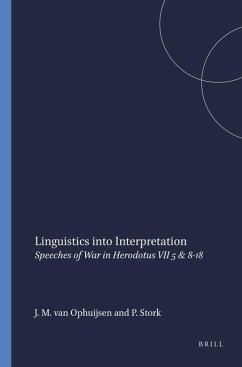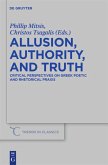This volume is a sustained exercise in the genre of secondary literature which aims at explaining a literary work as much as possible in and through the author's own words. A crucial passage in direct speech by different speakers from the History of Herodotus, the earliest long Greek prose text, has been made the object of a systematic effort to distill and analyse the linguistic characteristics relevant to its interpretation, by confronting it with the rest of the work as well as with earlier and contemporary writings. This is done with the primary aim of placing the interpretation of a major author on the firmest ground available, the author's ipsissimi verba. The result, made accessible by full indexes, will prove helpful to readers of any part of Herodotus' History.
Bitte wählen Sie Ihr Anliegen aus.
Rechnungen
Retourenschein anfordern
Bestellstatus
Storno


